Was 1981 the most important year in synth as far becoming ubiquitous in the mainstream and hitting the top of the charts internationally?
Yes, ‘Autobahn’ and ‘Oxygène’ came before, while the Giorgio Moroder produced ‘I Feel Love’ by Donna Summer is acknowledged as being the track that changed pop music forever and still sounds like the future even in the 21st Century. French electronic disco like ‘Magic Fly’ and ‘Supernature’ also made its impact.
Meanwhile closer to home, a post-punk revolution was already permeating in the UK with the advent of affordable synthesizers from Japan being adopted by the likes of THE NORMAL, THROBBING GRISTLE, CABARET VOLTAIRE and THE HUMAN LEAGUE. But it was Gary Numan who took the sound of British synth to No1 with ‘Are Friends Electric?’ and ‘Cars’ in 1979. It signalled a change in the musical landscape as the synth was considered a worthy mode of youthful expression rather than as a novelty, using one finger instead of three chords.
Despite first albums from John Foxx and OMD, 1980 was a transitional time when the synth was still the exception rather than the rule. But things were changing and there had also been the release of the first Midge Ure-fronted ULTRAVOX album ‘Vienna’ and the eponymous debut long player by VISAGE just as The Blitz Club and the New Romantic movement were making headlines. With the acclaim for the ‘Some Bizarre Album’ in early 1981 which launched the careers of DEPECHE MODE, SOFT CELL, BLANCMANGE, THE THE and B-MOVIE, a wider electronic breakthrough was now almost inevitable.
VISAGE’s ‘Fade To Grey’ went on to be a West German No1 in Spring 1981 and this exciting period culminated in THE HUMAN LEAGUE taking ‘Don’t You Want Me?’ to the top spot in the US six months year after becoming the 1981 UK Christmas No1. It would be fair to say that after this, the purer sound of synth was never quite the same again.
For many listeners, 1981 was a formative year and had so many significant new releases that it was difficult to stretch the limited pocket money to fund album purchases. ELECTRICITYCLUB.CO.UK even took to selling bootleg C90 cassettes on the school playground, promising a value-for-money “two albums for one” deal to support this disgusting habit!
Looking back to four decades ago when there were also albums from DEVO, EURYTHMICS, FAD GADGET, LOGIC SYSTEM, SPANDAU BALLET, SPARKS and TANGERINE DREAM, here are twenty albums which ELECTRICITYCLUB.CO.UK sees as contributing to the electronic legacy of 1981. Listed in alphabetical order with the restriction of one album per artist moniker, this is the way it was in the past, a long long time ago…
DAF Alles Ist Gut
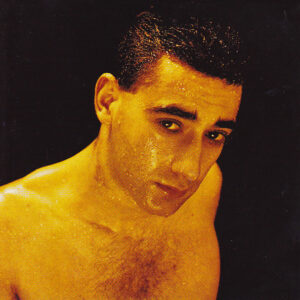 The late Gabi Delgado and Robert Görl released an acclaimed album trilogy produced by Conny Plank. The first ‘Alles Ist Gut’ featured their fierce breakthrough track ‘Der Mussolini’ which flirted with right wing imagery in its sardonic reflections on ideology. Causing controversy and confusing observers, DAF attracted a following which Delgado hated. Despite his parents escaping from the Franco regime in Spain, he was always unapologetic about his lyrical provocation.
The late Gabi Delgado and Robert Görl released an acclaimed album trilogy produced by Conny Plank. The first ‘Alles Ist Gut’ featured their fierce breakthrough track ‘Der Mussolini’ which flirted with right wing imagery in its sardonic reflections on ideology. Causing controversy and confusing observers, DAF attracted a following which Delgado hated. Despite his parents escaping from the Franco regime in Spain, he was always unapologetic about his lyrical provocation.
‘Alles Ist Gut’ is still available via Grönland Records
DEPECHE MODE Speak & Spell
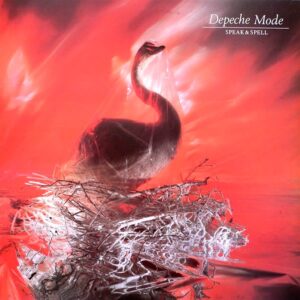 Having conceived the idea of a teenage synthpop group called SILICON TEENS, this dream of Daniel Miller became flesh and blood when he came across a young quartet from Basildon called DEPECHE MODE. Signing on a handshake 50/50 deal to his Mute Records, the group became a chart success. Despite great songs like ‘Puppets’ and ‘Tora! Tora! Tora!’, the group fragmented on the release of their 1981 debut album ‘Speak & Spell’.
Having conceived the idea of a teenage synthpop group called SILICON TEENS, this dream of Daniel Miller became flesh and blood when he came across a young quartet from Basildon called DEPECHE MODE. Signing on a handshake 50/50 deal to his Mute Records, the group became a chart success. Despite great songs like ‘Puppets’ and ‘Tora! Tora! Tora!’, the group fragmented on the release of their 1981 debut album ‘Speak & Spell’.
‘Speak & Spell’ is still available via Mute Records
DRAMATIS For Future Reference
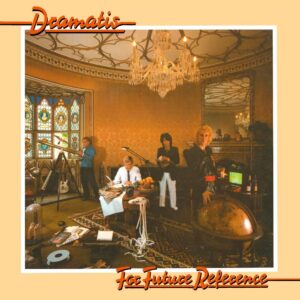 Following the live ‘retirement’ of Gary Numan, four of his erstwhile backing band became DRAMATIS. RRussell Bell, Denis Haines, Chris Payne and Ced Sharpley had been instrumental in the success of Numan’s powerful live presentation and their only album showcased the band’s virtuoso abilities. While the use of four different lead vocalists (including Numan himself on the superb ‘Love Needs No Disguise’) confused the continuity of the album, musically, there was much to enjoy.
Following the live ‘retirement’ of Gary Numan, four of his erstwhile backing band became DRAMATIS. RRussell Bell, Denis Haines, Chris Payne and Ced Sharpley had been instrumental in the success of Numan’s powerful live presentation and their only album showcased the band’s virtuoso abilities. While the use of four different lead vocalists (including Numan himself on the superb ‘Love Needs No Disguise’) confused the continuity of the album, musically, there was much to enjoy.
‘For Future Reference’ is now available via Cherry Red Records
http://www.numanme.co.uk/numanme/Dramatis.htm
DURAN DURAN Duran Duran
 It would be fair to say that DURAN DURAN took the arty poise of JAPAN and toned down their androgynous outré to make it more accessible. But their enduring appeal ofis great timeless pop songs and that was apparent on the self-titled debut album which at times sounded like an electronic band with a heavy metal guitarist bolted on, especially on ‘Careless Memories’ and ‘Friends Of Mine’. But most will just remember the two hits ‘Planet Earth’ and ‘Girls on Film’.
It would be fair to say that DURAN DURAN took the arty poise of JAPAN and toned down their androgynous outré to make it more accessible. But their enduring appeal ofis great timeless pop songs and that was apparent on the self-titled debut album which at times sounded like an electronic band with a heavy metal guitarist bolted on, especially on ‘Careless Memories’ and ‘Friends Of Mine’. But most will just remember the two hits ‘Planet Earth’ and ‘Girls on Film’.
‘Duran Duran’ is still available via EMI Records
JOHN FOXX The Garden
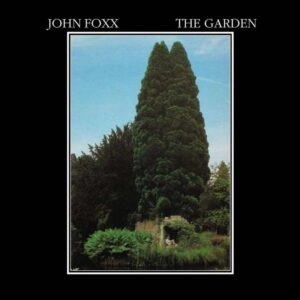 Thawing considerably following ‘Metamatic’, John Foxx admitted he had been “reading too much JG Ballard”. Exploring beautiful Italian gardens, his new mood was reflected in his music. ‘The Garden’ featured acoustic guitar and piano as showcased in the Linn Drum driven single ‘Europe After The Rain’. With choral experiments like ‘Pater Noster’, a return to art rock on ‘Walk Away’ and the more pastoral climes of the title track, Foxx had now achieved his system of romance.
Thawing considerably following ‘Metamatic’, John Foxx admitted he had been “reading too much JG Ballard”. Exploring beautiful Italian gardens, his new mood was reflected in his music. ‘The Garden’ featured acoustic guitar and piano as showcased in the Linn Drum driven single ‘Europe After The Rain’. With choral experiments like ‘Pater Noster’, a return to art rock on ‘Walk Away’ and the more pastoral climes of the title track, Foxx had now achieved his system of romance.
‘The Garden’ is still available via Edsel Records
HEAVEN 17 Penthouse & Pavement
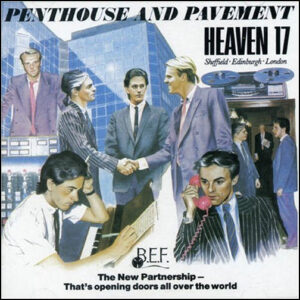 HEAVEN 17’s debut ‘Penthouse & Pavement’ was a landmark achievement, combining electronics with pop hooks and disco sounds while adding witty social and political commentary, taking in yuppie aspiration and mutually assured destruction. The first ‘Pavement’ side was a showcase of hybrid funk driven. The second ‘Penthouse’ side was like an extension of THE HUMAN LEAGUE’s ‘Travelogue’, Martyn Ware and Ian Craig Marsh’s swansong with the band.
HEAVEN 17’s debut ‘Penthouse & Pavement’ was a landmark achievement, combining electronics with pop hooks and disco sounds while adding witty social and political commentary, taking in yuppie aspiration and mutually assured destruction. The first ‘Pavement’ side was a showcase of hybrid funk driven. The second ‘Penthouse’ side was like an extension of THE HUMAN LEAGUE’s ‘Travelogue’, Martyn Ware and Ian Craig Marsh’s swansong with the band.
‘Penthouse & Pavement’ is still available via Virgin Records
THE HUMAN LEAGUE Dare
 Philip Oakey and Adrian Wright recruited Susanne Sulley, Joanne Catherall, Jo Callis and Ian Burden to record ‘Dare’ produced by Martin Rushent. Like KRAFTWERK meeting ABBA, the dreamboat collection of worldwide hits like ‘Love Action’ and ‘Don’t You Want Me?’ had a marvellous supporting cast in ‘The Things That Dreams Are Made Of’, ‘I Am The Law’, ‘Seconds’ and ‘Darkness’. Only the Linn Drum rework of ‘The Sound Of The Crowd’ blotted the album’s near perfection.
Philip Oakey and Adrian Wright recruited Susanne Sulley, Joanne Catherall, Jo Callis and Ian Burden to record ‘Dare’ produced by Martin Rushent. Like KRAFTWERK meeting ABBA, the dreamboat collection of worldwide hits like ‘Love Action’ and ‘Don’t You Want Me?’ had a marvellous supporting cast in ‘The Things That Dreams Are Made Of’, ‘I Am The Law’, ‘Seconds’ and ‘Darkness’. Only the Linn Drum rework of ‘The Sound Of The Crowd’ blotted the album’s near perfection.
‘Dare’ is still available via Virgin Records
http://www.thehumanleague.co.uk/
JAPAN Tin Drum
 JAPAN took the influences of the Far East even further with ‘Tin Drum’. A much more minimal album, there was hardly any guitar while the synths used were restricted to an Oberheim OBX, Prophet 5 and occasionally the Roland System 700. David Sylvian’s lyrical themes flirted with Chinese Communism as Brian Eno had done on ‘Taking Tiger Mountain (By Strategy), highlighted by the pentatonic polyrhythmic single ‘Visions Of China’ and its less frantic sister song ‘Cantonese Boy’.
JAPAN took the influences of the Far East even further with ‘Tin Drum’. A much more minimal album, there was hardly any guitar while the synths used were restricted to an Oberheim OBX, Prophet 5 and occasionally the Roland System 700. David Sylvian’s lyrical themes flirted with Chinese Communism as Brian Eno had done on ‘Taking Tiger Mountain (By Strategy), highlighted by the pentatonic polyrhythmic single ‘Visions Of China’ and its less frantic sister song ‘Cantonese Boy’.
‘Tin Drum’ is still available via Virgin Records
JEAN-MICHEL JARRE Magnetic Fields
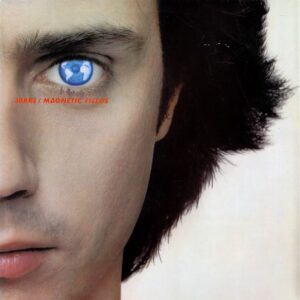 With his synthesized symphonies, Jean-Michel Jarre helped popularise the sound of electronic music. ‘Magnetic Fields’ was his first long player to utilise the Fairlight CMI which allowed him to absorb some musique concrete ideas such as water splashing and hydraulic train doors into his compositions. Featuring the klanky Korg Rhythm KR55, it was a much more percussive album than ‘Oxygène’ and ‘Equinoxe’ had been, complementing the metallic textures that featured.
With his synthesized symphonies, Jean-Michel Jarre helped popularise the sound of electronic music. ‘Magnetic Fields’ was his first long player to utilise the Fairlight CMI which allowed him to absorb some musique concrete ideas such as water splashing and hydraulic train doors into his compositions. Featuring the klanky Korg Rhythm KR55, it was a much more percussive album than ‘Oxygène’ and ‘Equinoxe’ had been, complementing the metallic textures that featured.
‘Magnetic Fields’ is still available via Sony Music
JON & VANGELIS The Friends Of Mr Cairo
 Having scored an unexpected UK hit with the sonic beauty of ‘I Hear You Now’, Jon Anderson and Vangelis presented a second album in ‘The Friends Of Mr Cairo’. Featuring ‘State Of Independence’ which was to become a hit for Donna Summer, the album was laced with spiritual overtones over symphonic synths, cinematic piano and dialogue samples from films. However, the album is best known for ‘I’ll Find My Way Home’ which had not been included on the original tracklisting.
Having scored an unexpected UK hit with the sonic beauty of ‘I Hear You Now’, Jon Anderson and Vangelis presented a second album in ‘The Friends Of Mr Cairo’. Featuring ‘State Of Independence’ which was to become a hit for Donna Summer, the album was laced with spiritual overtones over symphonic synths, cinematic piano and dialogue samples from films. However, the album is best known for ‘I’ll Find My Way Home’ which had not been included on the original tracklisting.
‘The Friends Of Mr Cairo’ is still available via Polydor Records
https://www.facebook.com/VangelisOfficial/
KRAFTWERK Computer World
 ‘Computer World’ could be considered one of the most prophetic albums of its time. KRAFTWERK forsaw the cultural impact of internet dating on ‘Computer Love’, but the title track highlighted the more sinister implications of surveillance by “Interpol and Deutsche Bank, FBI and Scotland Yard” with the consequences of its prophecy still very relevant discussion points today. But the dynamic rhythmic template of ‘Numbers’ was to have a major impact on Urban America.
‘Computer World’ could be considered one of the most prophetic albums of its time. KRAFTWERK forsaw the cultural impact of internet dating on ‘Computer Love’, but the title track highlighted the more sinister implications of surveillance by “Interpol and Deutsche Bank, FBI and Scotland Yard” with the consequences of its prophecy still very relevant discussion points today. But the dynamic rhythmic template of ‘Numbers’ was to have a major impact on Urban America.
‘Computer World’ is still available via EMI Records
LANDSCAPE From The Tea Rooms Of Mars To The Hell-holes Of Uranus
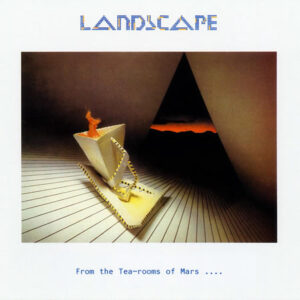 LANDSCAPE were led by producer Richard James Burgess who co-designed the Simmons SDSV. Using a Lyricon wind-controlled synth as its lead hook, ‘Einstein A-Go-Go’ was a fabulously cartoon-like tune about nuclear weapons falling into the hands of theocratic dictators and religious extremists! Meanwhile, ‘European Man’ predated EDM by having the phrase “electronic dance music” emblazoned on its single sleeve.
LANDSCAPE were led by producer Richard James Burgess who co-designed the Simmons SDSV. Using a Lyricon wind-controlled synth as its lead hook, ‘Einstein A-Go-Go’ was a fabulously cartoon-like tune about nuclear weapons falling into the hands of theocratic dictators and religious extremists! Meanwhile, ‘European Man’ predated EDM by having the phrase “electronic dance music” emblazoned on its single sleeve.
‘From The Tea Rooms Of Mars To The Hell-holes Of Uranus’ is still available via Cherry Red Records
https://twitter.com/Landscape_band
NEW ORDER Movement
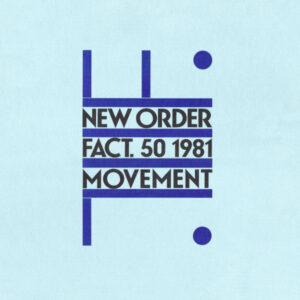 Rising from the ashes of JOY DIVISION, Peter Hook, Bernard Sumner and Stephen Morris chose the name NEW ORDER as a symbol of their fresh start and after deciding against recruiting a new vocalist, Morris’ girlfriend and later wife, Gillian Gilbert was recruited. Despite Martin Hannett still producing, recording sessions were fraught although synths were taking greater prominence while Morris used a Doctor Rhythm DR55 drum machine on ‘Truth’ and ‘Doubts Even Here’.
Rising from the ashes of JOY DIVISION, Peter Hook, Bernard Sumner and Stephen Morris chose the name NEW ORDER as a symbol of their fresh start and after deciding against recruiting a new vocalist, Morris’ girlfriend and later wife, Gillian Gilbert was recruited. Despite Martin Hannett still producing, recording sessions were fraught although synths were taking greater prominence while Morris used a Doctor Rhythm DR55 drum machine on ‘Truth’ and ‘Doubts Even Here’.
GARY NUMAN Dance
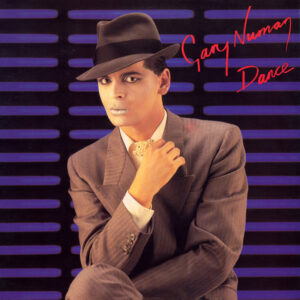 Following his ‘retirement’ from live performance, the last thing Numanoids expected was an understated Brian Eno homage. At nearly an hour’s playing time, ‘Dance’ outstayed its welcome with ‘Slowcar To China’ and ‘Cry The Clock Said’ stretching to 10 minutes. Much was made of JAPAN’s Mick Karn playing fretless bass although he was only on five of the eleven tracks. In ‘A Subway Called You’ and ‘Crash’, there were some great moments.
Following his ‘retirement’ from live performance, the last thing Numanoids expected was an understated Brian Eno homage. At nearly an hour’s playing time, ‘Dance’ outstayed its welcome with ‘Slowcar To China’ and ‘Cry The Clock Said’ stretching to 10 minutes. Much was made of JAPAN’s Mick Karn playing fretless bass although he was only on five of the eleven tracks. In ‘A Subway Called You’ and ‘Crash’, there were some great moments.
‘Dance’ is still available via Beggars Banquet Records
OMD Architecture & Morality
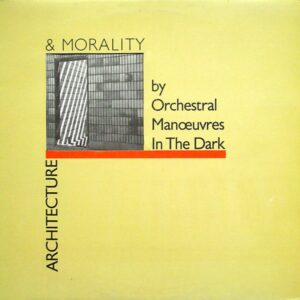 ”I think ‘Architecture & Morality’ was a complete album, it was just so whole” said Paul Humphreys in 2010. The big booming ambience next to big blocks of Mellotron choir gave OMD their masterpiece, tinged more with LA DÜSSELDORF rather than KRAFTWERK. Featuring two spirited songs about ‘Joan Of Arc’, these were to become another pair of UK Top 5 hits with the ‘Maid of Orleans’ variant also becoming 1982’s biggest selling single in West Germany.
”I think ‘Architecture & Morality’ was a complete album, it was just so whole” said Paul Humphreys in 2010. The big booming ambience next to big blocks of Mellotron choir gave OMD their masterpiece, tinged more with LA DÜSSELDORF rather than KRAFTWERK. Featuring two spirited songs about ‘Joan Of Arc’, these were to become another pair of UK Top 5 hits with the ‘Maid of Orleans’ variant also becoming 1982’s biggest selling single in West Germany.
‘Architecture & Morality’ is still available via Virgin Records
SIMPLE MINDS Sons & Fascination / Sister Feelings Call
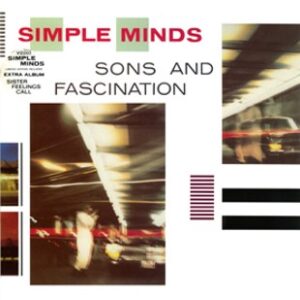 This generally overlooked double opus exploited the Germanic influences of SIMPLE MINDS to the full, under the production auspices of Steve Hillage. From the singles ‘The American’ and ‘Love Song’ to the mighty instrumental ‘Theme For Great Cities’ and the unsettling dentist drill menace of ‘70 Cities As Love Brings The Fall’, with basslines articulating alongside synths and guitars almost as one, this was SIMPLE MINDS at close to their very best.
This generally overlooked double opus exploited the Germanic influences of SIMPLE MINDS to the full, under the production auspices of Steve Hillage. From the singles ‘The American’ and ‘Love Song’ to the mighty instrumental ‘Theme For Great Cities’ and the unsettling dentist drill menace of ‘70 Cities As Love Brings The Fall’, with basslines articulating alongside synths and guitars almost as one, this was SIMPLE MINDS at close to their very best.
‘Sons & Fascination / Sister Feelings Call’ is still available via Virgin Records
SOFT CELL Non-Stop Erotic Cabaret
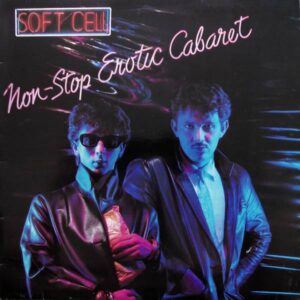 In their cover of ‘Tainted Love’, SOFT CELL provided the first true Synth Britannia crossover record. One of the best albums of 1981, ‘Non-Stop Erotic Cabaret’ captured the edginess of minimal synth arrangements while married to an actual tune. At the time, art school boys Marc Almond and Dave Ball were rated higher than DEPECHE MODE. But with the follow-up success of the Top5 singles ‘Bedsitter’ and ‘Say Hello Wave Goodbye’, the pair became reluctant popstars.
In their cover of ‘Tainted Love’, SOFT CELL provided the first true Synth Britannia crossover record. One of the best albums of 1981, ‘Non-Stop Erotic Cabaret’ captured the edginess of minimal synth arrangements while married to an actual tune. At the time, art school boys Marc Almond and Dave Ball were rated higher than DEPECHE MODE. But with the follow-up success of the Top5 singles ‘Bedsitter’ and ‘Say Hello Wave Goodbye’, the pair became reluctant popstars.
‘Non-Stop Erotic Cabaret’ is still available via Mercury Records
TELEX Sex
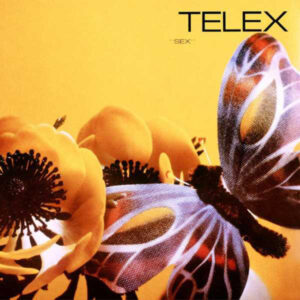 ‘Sex’ was Belgian trio TELEX’s third album and a collaboration with SPARKS that saw them contribute lyrics to all nine tracks. Experiments in swing on ‘Sigmund Freud’s Party’ displayed a sophisticated vintage musicality and ‘Haven’t We Met Somewhere Before?’ was the hit single that never was. Meanwhile, like KRAFTWERK meeting YELLOW MAGIC ORCHESTRA, ‘Brainwash’ was quite obviously the blueprint for LCD SOUNDSYSTEM’s ‘Get Innocuous!’.
‘Sex’ was Belgian trio TELEX’s third album and a collaboration with SPARKS that saw them contribute lyrics to all nine tracks. Experiments in swing on ‘Sigmund Freud’s Party’ displayed a sophisticated vintage musicality and ‘Haven’t We Met Somewhere Before?’ was the hit single that never was. Meanwhile, like KRAFTWERK meeting YELLOW MAGIC ORCHESTRA, ‘Brainwash’ was quite obviously the blueprint for LCD SOUNDSYSTEM’s ‘Get Innocuous!’.
‘Sex’ was released by Ariola, currently unavailable
https://www.facebook.com/TELEX-312492439327342
ULTRAVOX Rage In Eden
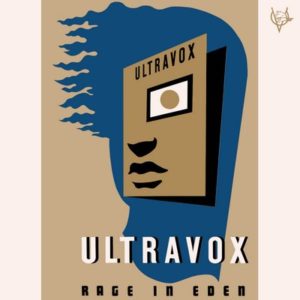 ‘Rage in Eden’ began with the optimistic spark of ‘The Voice’ but it was something of a paranoia ridden affair from ULTRAVOX having been created at Conny Plank’s remote countryside studio near Cologne. There was synthetic bass power on ‘The Thin Wall’, ‘We Stand Alone’ and ‘I Remember (Death In The Afternoon)’, but there was also the tape experimentation of the title track using the chorus of ‘I Remember’ played backwards to give an eerie Arabic toned effect.
‘Rage in Eden’ began with the optimistic spark of ‘The Voice’ but it was something of a paranoia ridden affair from ULTRAVOX having been created at Conny Plank’s remote countryside studio near Cologne. There was synthetic bass power on ‘The Thin Wall’, ‘We Stand Alone’ and ‘I Remember (Death In The Afternoon)’, but there was also the tape experimentation of the title track using the chorus of ‘I Remember’ played backwards to give an eerie Arabic toned effect.
‘Rage In Eden’ is still available via EMI Records
YELLOW MAGIC ORCHESTRA BGM
 ‘BGM’, the third full length album from YELLOW MAGIC ORCHESTRA was the first recording to feature the now iconic Roland TR-808 Rhythm Composer and was also made using a digital 3M 32-track machine. More experimental than their first Technopop focussed long players, the best song ‘Camouflage’ was a curious beat laden blend of Eastern pentatonics and Western metallics from which the German synth band CAMOUFLAGE took their name.
‘BGM’, the third full length album from YELLOW MAGIC ORCHESTRA was the first recording to feature the now iconic Roland TR-808 Rhythm Composer and was also made using a digital 3M 32-track machine. More experimental than their first Technopop focussed long players, the best song ‘Camouflage’ was a curious beat laden blend of Eastern pentatonics and Western metallics from which the German synth band CAMOUFLAGE took their name.
‘BGM’ is still available via Sony Music
Text by Chi Ming Lai
9th January 2021


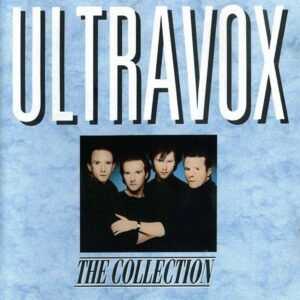
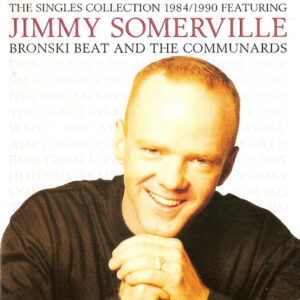
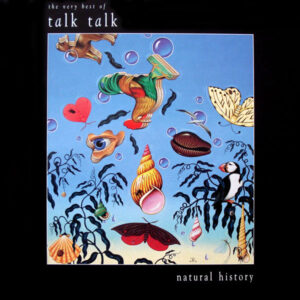
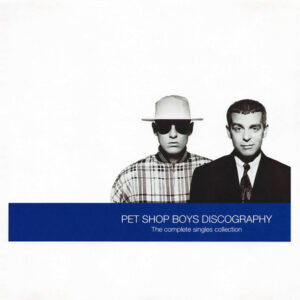
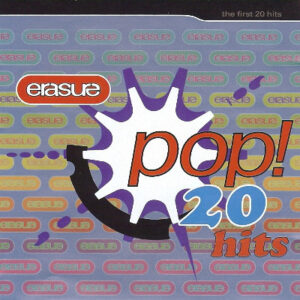

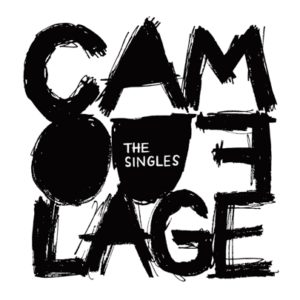
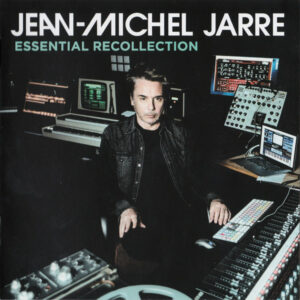
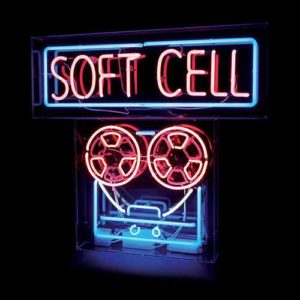


Follow Us!